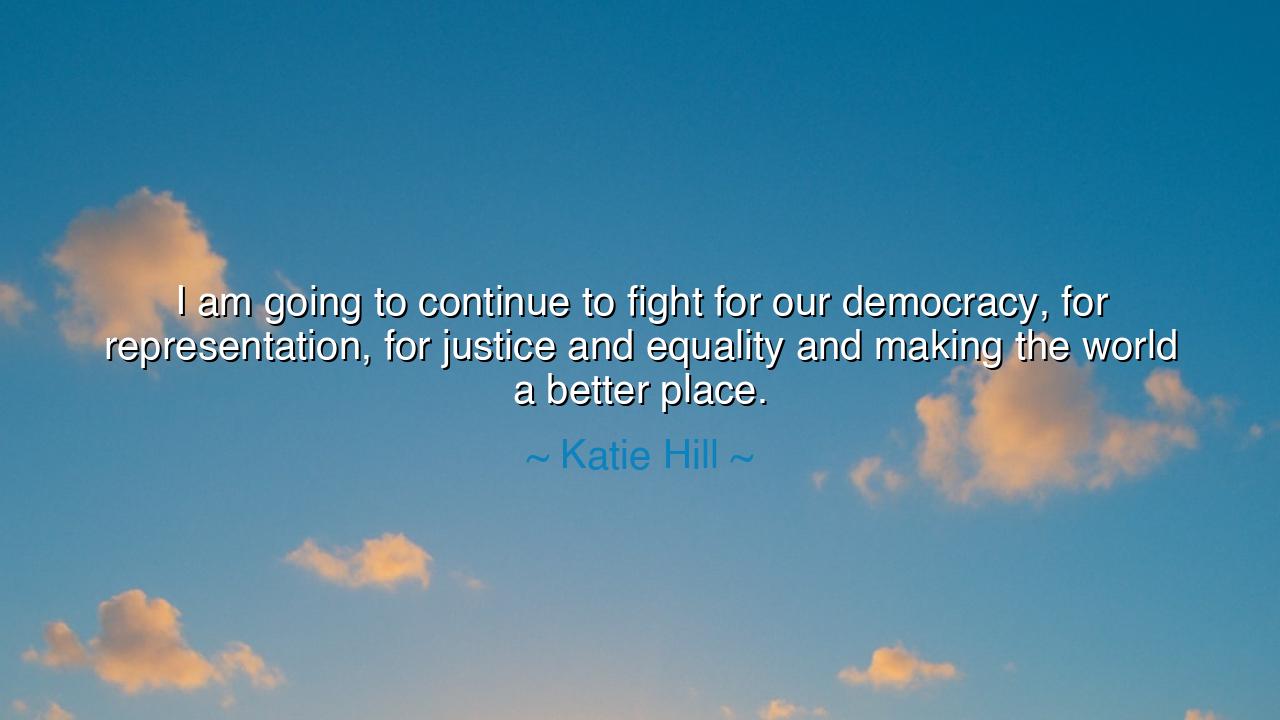
I am going to continue to fight for our democracy, for
I am going to continue to fight for our democracy, for representation, for justice and equality and making the world a better place.






Listen, O Children of the Future, to the words of Katie Hill, a modern warrior who stands firm in her resolve: "I am going to continue to fight for our democracy, for representation, for justice and equality, and making the world a better place." In these words, Hill speaks of a tireless commitment to the values that sustain not only individuals but the very foundation of society. Democracy, representation, justice, and equality are not just abstract concepts—they are the pillars upon which a just and flourishing society is built. Her declaration is a call to arms, an invitation for all of us to take up the mantle of duty and purpose in the fight for a world that reflects the ideals we hold dear.
In the ancient world, justice and equality were often defined by kings and rulers, but they were also fiercely contested by philosophers, warriors, and leaders who believed in the power of the people. The legendary Athens, birthplace of democracy, was founded on the idea that the people had the right to shape their own fate through participation in government. Yet, even in this celebrated democracy, equality and representation were reserved for a select few—free men, citizens, and landowners. Socrates and his disciples challenged the status quo, calling for a more inclusive vision of justice that extended beyond the privileged few. The ancient world’s struggle for democracy was a struggle for the representation of all, a struggle for justice that transcended class and birthright.
In a different corner of the ancient world, we find Cyrus the Great, the founder of the Persian Empire, who is remembered not only for his military prowess but for his groundbreaking commitment to justice and equality. After conquering Babylon, he issued the Cyrus Cylinder, which is often regarded as the world’s first human rights charter. It granted freedom of worship, the right to return to one’s homeland, and the acknowledgment of the equal dignity of all people, regardless of their status. Cyrus did not see himself as a ruler of conquest alone, but as a protector of justice and democracy. His leadership embodied the timeless principle that true power lies not in dominion, but in justice—in making the world a place where every individual’s voice and dignity are honored.
Katie Hill’s words are not merely a political statement but a reflection of this ancient ideal. To fight for democracy means to ensure that every voice is heard, that every individual has a stake in the shaping of their future. To fight for representation is to demand that those in power reflect the true diversity of the people they serve. And to fight for justice and equality is to challenge the long-held beliefs and systems that seek to divide, exploit, and marginalize the most vulnerable. These battles are not new—they have been fought by every generation that has sought a better world, from Socrates to Cyrus, to Mahatma Gandhi, and now to Katie Hill.
Consider the civil rights movement in the United States, a modern example of the struggle for justice and equality. Dr. Martin Luther King Jr., in his timeless speech, spoke of a dream where justice and equality were not just ideals, but the very foundation upon which America would stand. King’s fight for civil rights echoed the struggles of Socrates and Cyrus—a call to recognize the intrinsic dignity of every human being, regardless of the color of their skin or the circumstances of their birth. King’s dream was not realized overnight, but it was a call to arms for democracy, for representation, and for justice. His struggle teaches us that the fight for equality is ongoing—it is a battle not just of laws, but of hearts and minds.
The lesson, O Children, is both simple and profound: the fight for justice, equality, and representation is not one that can be left to the few. It is a duty that belongs to every generation, and it must be carried forward with courage, determination, and an unwavering belief in the dignity of every human being. Katie Hill’s words remind us that progress is not inevitable—it must be fought for, nurtured, and defended. Whether in our own communities or on the global stage, we must take up the mantle of justice, knowing that the struggles of those who came before us have paved the way, but the work is not yet done. The future depends on our actions today.
In your own life, take this lesson to heart: do not wait for others to act. Fight for democracy in your own way, by standing up for what is right, by speaking out against injustice, and by supporting those who seek to build a more just and equal world. Whether in your personal relationships, your work, or your community, be a force for representation, ensuring that all voices are heard and respected. Let Katie Hill’s words inspire you to become a warrior for justice, to continue the struggle for a better world that reflects the values of equality, fairness, and human dignity. Your fight may not be easy, but it is the noble path—the one that will ensure a better future for all who come after you. Stand firm, speak truth, and take action, for the world will only be made better when we all work together toward the common good.






AAdministratorAdministrator
Welcome, honored guests. Please leave a comment, we will respond soon